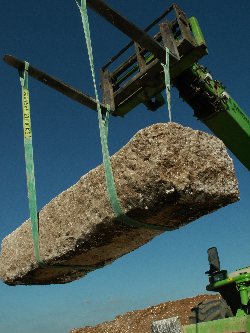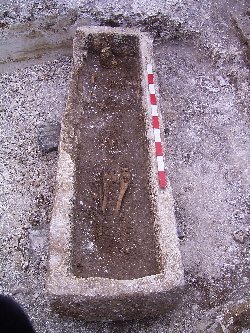A Roman stone coffin, probably dating to the 3rd or 4th centuries AD, was discovered in archaeological excavations in advance of the Poundbury Stages 3-4 development at Poundbury Farm, Poundbury, Dorchester.
The coffin was found in one of nine excavation areas totalling three hectares. It is the only burial so far excavated in that area but a further six or more features scattered across the area are thought likely to prove to be Roman burials when excavated. A further ninefeatures thought to be graves have been identified in the adjacent Area 4. A small square enclosure in this area may represent a garden of remembrance.


The lid was still on the coffin which contained a poorly preserved skeleton. Until the remains have been examined by an expert it is not possible to give the age and sex of the deceased. Their mourners had placed a pair of boots or shoes by their feet, as shown by the iron hobnails found near the feet.
The placing of footwear in graves was common in Roman Britain in the third and fourth centuries and it is thought that, like placing a coin in the mouth to pay the ferryman, this was to help the dead make their final journey.
All the probable burials lie in or close to, the paddocks and compounds of a Roman farm, with several aligned along the banks and ditches of the compounds. This pattern is typical for burials associated with late Roman farms and contrasts with the large, densely used and well organised urban cemetery not far to the east at Poundbury Camp.

Stone coffins are not common finds, and their manufacture and transport from quarries, often some distance away, would have involved some expense and suggests that the person buried in the Poundbury Farm coffin may have been of some standing. The stone has yet to be identified but of the ten coffins found in the Poundbury Camp cemetery, eight were of Ham Hill stone, one of Portland Limestone and one of Greensand. The stone coffin has now been removed from the excavation and is stored at Poundbury Farm.
The current excavations follow on from an evaluation of the whole site and are the latest in a long series of archaeological works undertaken in advance of the creation of Poundbury. The works are one of the planning conditions and are monitored by Dorset County Council’s Archaeological Service. After the report on the excavation has been published the archive will be deposited with the Dorset County Museum, Dorchester.
The discovery of the coffins has created some local interest and has been reported in the Dorset Echo and sister papers, the Western Daily Press and the BBC News and the 24dash.com public sector websites. The finds have also been included in a lecture given to an archaeological conference in Dorchester on Saturday 8th.

